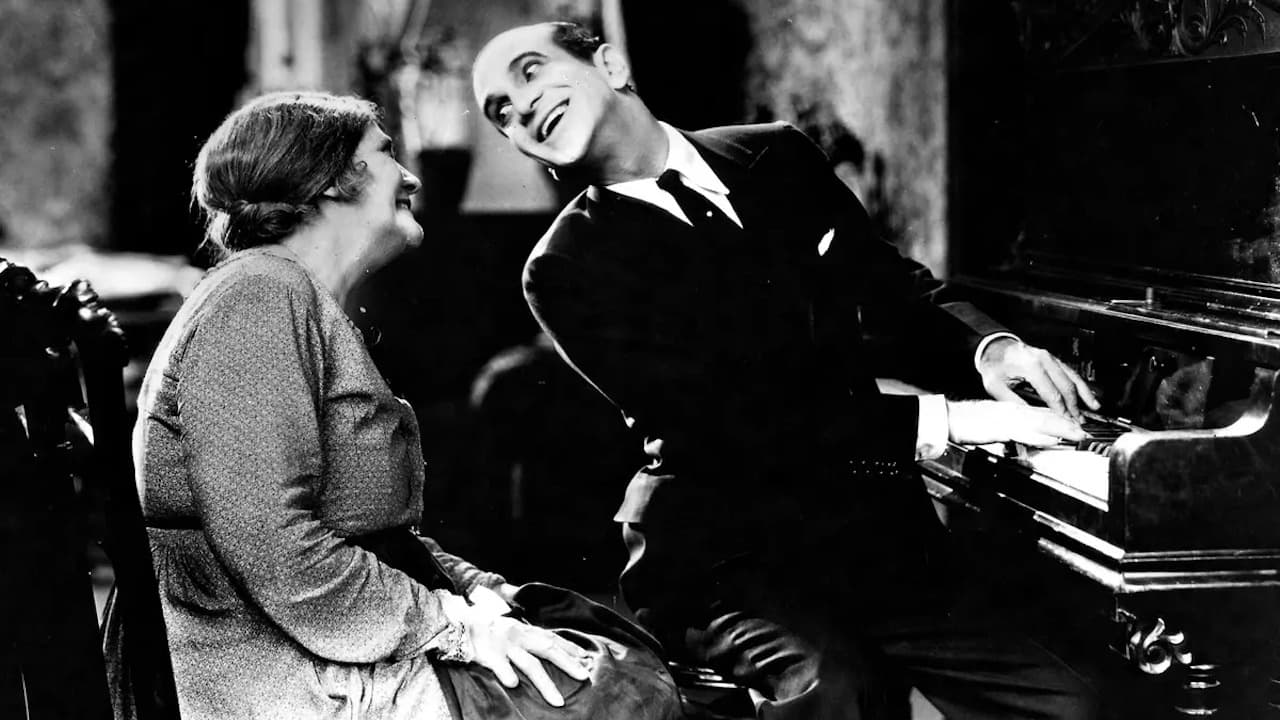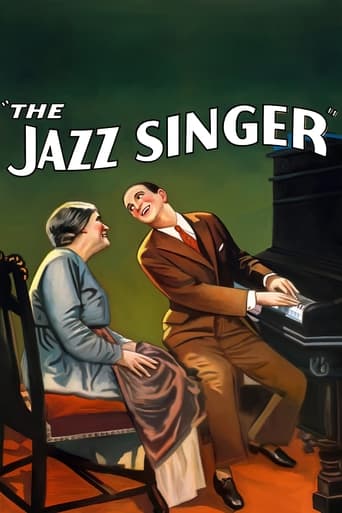



the leading man is my tpye
Truly Dreadful Film
Memorable, crazy movie
it is the rare 'crazy' movie that actually has something to say.
View MoreAssistant director: Gordon Hollingshead. Sound recording: George R. Groves. Vitaphone Sound System. Sound technician: William A. Mueller. Sound supervisor: Nathan Levinson.Copyright 6 October 1927 by Warner Bros. Pictures, Inc. New York opening at the Warners' Theatre, 6 October 1927. U.S. release: 4 February 1928. 9 reels. 8,117 feet. 90 minutes.SYNOPSIS: Young man wants to be a jazz singer, but dad wants him to follow in his footsteps as cantor in the local synagogue.NOTES: Special Academy Award, Warner Bros.: "for producing The Jazz Singer, the pioneer outstanding talking picture, which has revolutionized the industry." Also nominated for Writing Adaptation (Seventh Heaven) and Special Engineering Effects (Wings).Domestic rental gross: $3½ million. Re-made as The Jolson Story (1946), The Jazz Singer (1953), The Jazz Singer (1980).Although this was the first feature film in which spoken dialogue was heard from the screen, that dialogue was limited. The Jazz Singer is primarily a silent movie with a synchronized music score, plus songs.The original Broadway play opened at the Fulton on 14 September 1925 and ran a highly successful 315 performances. Albert Lewis directed Howard Lane, Sam Jaffe and star, George Jessel, who was contracted to do the movie but balked when the studio decided to add sound to four songs. He demanded more money. The studio refused and Jolson was engaged instead.COMMENT: The story set the pattern for talkies — sentimental, synthetic, a bit of manufactured drama carelessly tossed away to cater for box office demand — and nowhere is this more evident than at the conclusion where a title card glibly explains that time heals all wounds and allows Jolson to go into his concluding number Mammy.Jolson's last two numbers in blackface are infinitely more acceptable than his others owing to his exaggerated mannerisms which even by silent standards (and in contrast to most of the other players — Besserer and Lederer even are not this bad) are exceedingly hammy. Jolson and Besserer are the only players that have any dialogue and then only in one stretch. Jolson has a few other lines between numbers and Oland has one word, "Stop!" The other players are completely speechless, though Cantor Josef Rosenblatt has a song and young Bobbie Gordon has a couple of numbers (though we suspect his are dubbed). There is very little use of sound effects — applause only — even obvious effects like knocking on doors being underscored only by music — and that too is kitsch. Still, May McAvoy makes a charming heroine, Myrna Loy is effective in a bit as a sneaky-eyed gossiping chorus girl. And even without his voice Roscoe Karns' personality comes across in his single scene at the railroad station. Demarest has a tiny part as a ravenous diner. The film is rather slow and the direction (aside from a rapid tracking shot through the street on Jolson's return home) is undistinguished — although I like the way he solves the problem of keeping the story going at the climax during the songs, by intercutting them with sub-titles!
View MoreThe son of a Jewish Cantor (Al Jolson) must defy the traditions of his religious father in order to pursue his dream of becoming a jazz singer.Today (2015) this film is known for two things: being the first feature-length film to have sound, and for having its star perform in blackface. For the former, it will always be historically important. For the latter, it will always be looked down upon by some, though it should be seen less as a racist film and more a simple product of the time.Either way, it is just not that great of movie. If you like hearing 1920s songs sung by a guy swinging his hips, you may enjoy it. And it has something to say about sons going their own way, even when they could easily follow their father. But the movie is really not that amazing.
View MoreThe "roaring twenties" was a huge time for the United States! There were many new things going on! One huge thing was that people would go to movie theaters to watch old silent films! This was also when the prohibition happened so people were having parties and the crime family thrived with illegal usage and selling of alcohol. The twenties was also the birth of a whole new genre of music: Jazz! Starting in Harlem, jazz quickly grew everywhere in the US. But something in 1927 happened that no one thought would happen, The Jazz Singer came out! This movie was the very first talkie! Most major movie companies thought that the world was not ready for a talkie was it was deemed to be a complete and utter failure. Something surprised them, however, it was a huge success, gaining money and putting a lot of silent actors into a jobless environment. This movie was a stepping stone to cinema history!
View MoreSeldom do I give a 10 star rating as few films are perfect, but this movie is as close to perfect as it could get for a silent film. The story line is sweet, the dubbed over original soundtrack is wonderful, making it interesting, and never left me wanting it to hurry up and end. Because this movie is available on Blu-ray, made it even better for having the quality it deserves. It certainly should be listed as a classic silent film in the top 100 of the genre. To rate this movie with just one word,"Fantastic", would be more than enough. It would be fair to say that this great early film is wonderful as the other top silent films of the age, such as the Big Parade, Wings, Sunrise, the Crowd and many, many others.
View More